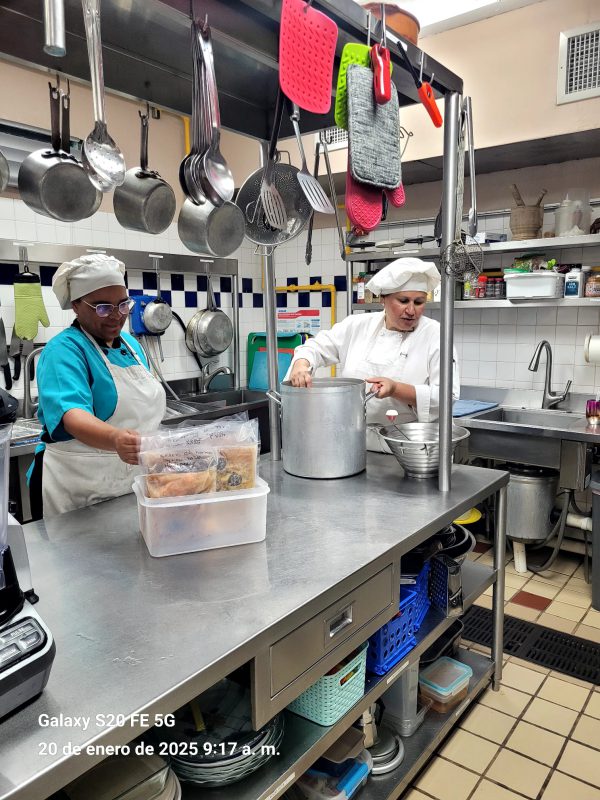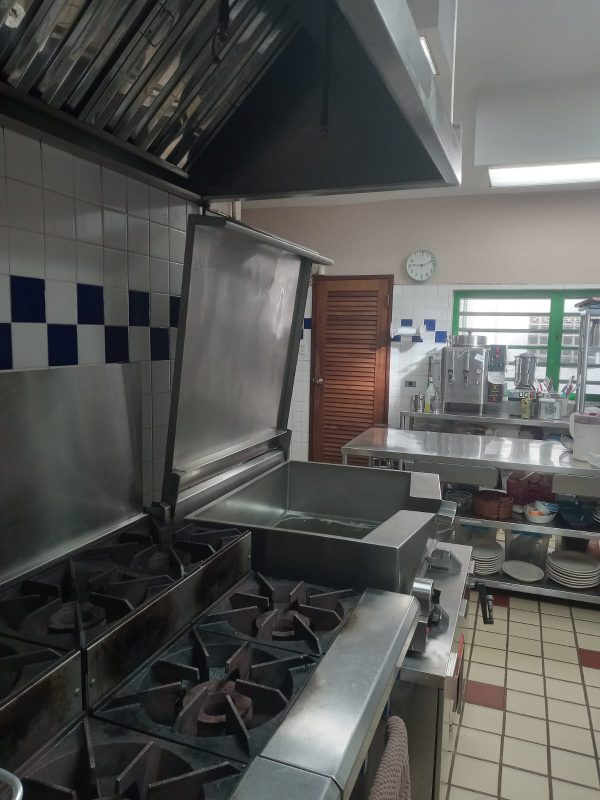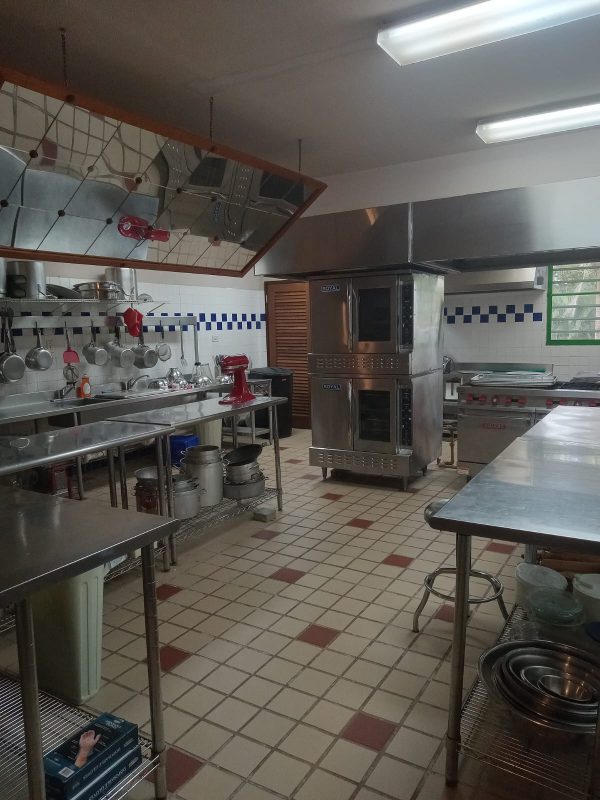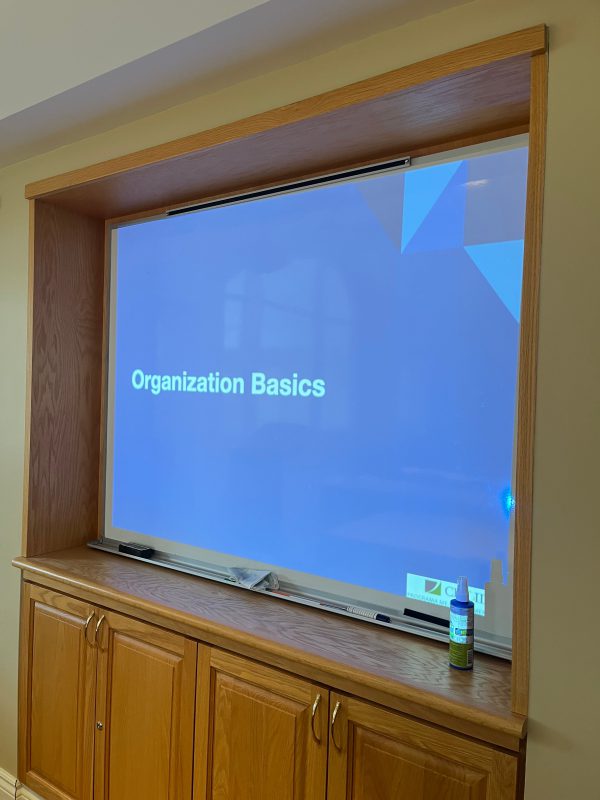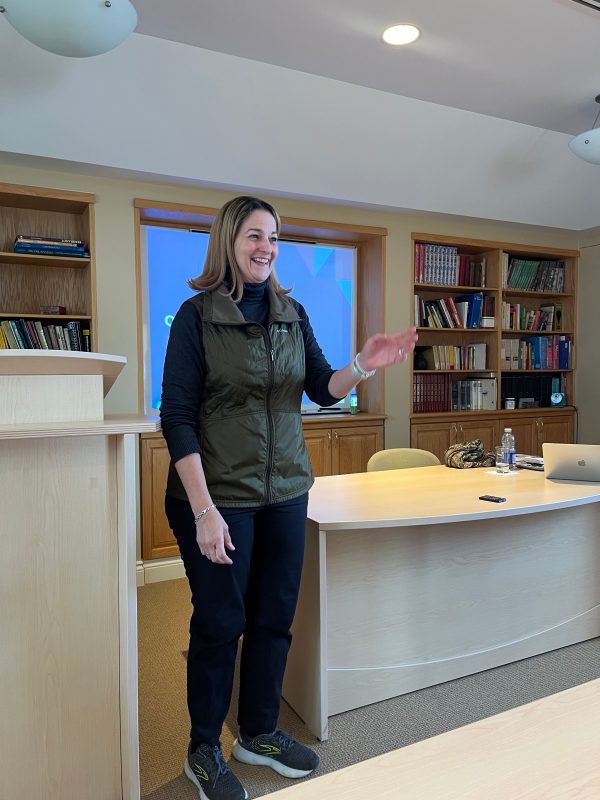Con el inicio del año, nuestros consultores del Programa de Mejora en Alimentación han realizado visitas de seguimiento en puntos muy dispares del globo terráqueo. En concreto, hemos trabajado con profesionales del servicio de alimentación en Puerto Rico, Canadá e Italia.
PUERTO RICO: el pasado mes de noviembre recomenzamos el PMA en Puerto Rico. Patricia García Burgos y Cristina Bofarull pusieron las bases de este programa en la isla. En enero, Joanna Riestra, que también es consultora PMA, realizó una visita de implantación en Paloblanco, Conference Center en Río Grande.
Betsy Echeverría, que trabaja en este centro, nos traslada su experiencia: “Tras los días de trabajo con Joanna, dimos un gran paso en la organización y en la comprensión de nuestras responsabilidades según cada puesto de trabajo. Con el seguimiento que estamos teniendo por parte del Ceicid, ganamos en confianza, seguridad y motivación. Comenzamos realmente a realizar los trabajos de producción de una manera eficaz, gracias a todos los análisis de cocción, manejo, almacenaje y registro de nuestra producción. Todos importantes para cuidar la calidad de la producción.
Se siente muy bien mirar un registro y saber con lo que cuentas y con lo que no, evitando pérdidas de tiempo. Estos resultados me han servido de mucha motivación para querer realizar mi trabajo con más competencia profesional y contribuir más eficazmente a mi equipo y a la administración. Estoy agradecida a este proyecto, porque además de mejorar la organización del trabajo y el equipo y de aumentar la productividad, me ayuda a querer seguir aprendiendo y contagiar ese deseo en mi entorno”.
CANADÁ: During our recent visit to Canada, we started the implementation of PMA at Soulanges. This visit not only allowed us to share insights but also provided invaluable hands-on experience with processes and techniques essential. Through a series of sessions and workshops, we explored key areas such as change management, kitchen organization, collaborative teamwork, and the integration of advanced food production technologies. Here’s a look at the key highlights from our visit.
A central focus of our visit was Change Management: Adapting to New Realities, where we emphasized the importance of adapting to new circumstances and challenges. In the ever-evolving hospitality industry, change is a constant, whether driven by new technologies, market demands, or internal processes. As a team, we discussed the need for embracing change and maintaining flexibility to ensure that our operations continue to meet the highest standards and taking care of the people under our care. We recognized that change is not only about responding to external pressures but also about proactively finding better ways to work, which is key to long-term growth.
In the session on the Bases of Production, our team delved into the organization of kitchen operations, focusing on workflows and the critical importance of planning. We agreed that a well-structured kitchen is the backbone of any administration. Streamlining processes, from inventory management to dish preparation, ensures efficiency and quality. We collectively discussed best practices for organizing kitchen spaces and optimizing production processes, with the goal of creating an environment where our culinary teams can focus on delivering exceptional meals while minimizing operational bottlenecks.
One of the most engaging parts of the visit was the building of our Meal Offer (Oferta Gastronómica). During this workshop, we collaborated to develop a menu cycle that considered customer preferences, seasonality, ingredient availability, and nutritional balance. By aligning our meal offering with the brand’s values, we aimed to enhance the overall dining experience. The team worked together to create a diverse menu that balances creativity with practicality, ensuring it meets the needs and expectations of our guests while also optimizing operational efficiency.
A standout experience during the visit was the hands-on training with vacuum packing machines, allowing us to explore advanced food preservation techniques. This technology offers tremendous potential for improving food safety, extending shelf life, and reducing waste. During the session, we learned how to integrate vacuum sealing into our daily food production processes. Our team was excited to apply this technique for the first time, and we’re eager to incorporate it into our operations for improved consistency and efficiency.
The final session was on Collaborative Work for Teams helped us reflect on how we can improve teamwork and communication across departments. We discussed strategies for fostering a collaborative culture where every team member feels empowered to contribute ideas and work towards common goals. Through SWOT analysis and group discussions, we identified ways to break down silos and improve cooperation, ultimately creating a more cohesive and efficient working environment.
This visit to Canada provided us with a valuable opportunity to reflect on how we can continuously improve our hospitality operations. By embracing new ideas and techniques in areas like change management, food production, and teamwork, we are better equipped to meet future challenges while delivering exceptional service to our guests. We are now with a renewed focus on adaptability, planning, and collaboration—core principles that will continue to drive our project.
The opportunity to work together as a team, learn from one another, and share our experiences was truly inspiring. We are excited to implement these strategies and insights in our day-to-day operations, ensuring we continue to innovate, grow, and offer the best possible experiences for the Team and for the people who visit Manoir de Beaujeu.
ITALIA: Nuestra consultora del PMA Patricia García Burgos se ha trasladado a Italia para implantar y hacer seguimiento en distintas sedes. En Casale d´Ocre, casa de retiros situada en L’Aquila, se ha realizado la primera visita de implantación. Por otra parte, Patricia realizó la segunda visita de implantación del PMA en Villa delle Rose. Patricia nos cuenta cómo han sido las jornadas de trabajo estas semanas de enero: “Me he encontrado con equipos de trabajo con gran nivel profesional, de diferentes culturas, lo cual aporta diversidad en la oferta gastronómica. Esto es un gran valor, puesto que los usuarios que frecuentan estas dos sedes proceden de distintas zonas del mundo. Después de 3 días de entrevistas, conocimiento de instalaciones, estudio de los platos, sesiones de formación y talleres, se han definido dos áreas de trabajo: planificación y comunicación. Además hemos trabajado en la línea de aprovechar productos Km 0, definir bases de producción, profundizar en la cocina a baja temperatura, y la cocción y conservación envasando al vacío en aras de una mayor calidad y rentabilidad en las cámaras y congeladores. Tras estas visitas, las profesionales de estas dos sedes continúan con el seguimiento por zoom, para acompañar y ayudar a superar obstáculos y poder implantar en el tiempo previsto el PMA”.
